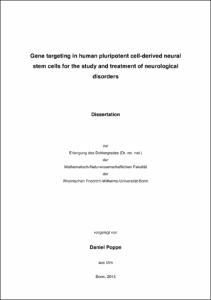Gene targeting in human pluripotent cell-derived neural stem cells for the study and treatment of neurological disorders

Gene targeting in human pluripotent cell-derived neural stem cells for the study and treatment of neurological disorders

| dc.contributor.advisor | Brüstle, Oliver | |
| dc.contributor.author | Poppe, Daniel | |
| dc.date.accessioned | 2020-04-21T10:34:57Z | |
| dc.date.available | 2020-04-21T10:34:57Z | |
| dc.date.issued | 19.11.2015 | |
| dc.identifier.uri | https://hdl.handle.net/20.500.11811/6559 | |
| dc.description.abstract | Modern stem cell technology has made remarkable progress in recent years with the discovery of induced pluripotency, enabling the production of any cell type from any person in unlimited quantities, as well as improved protocols for the generation of stable neural stem cells to generate all cells of the central nervous system. This forms the base to examine neurons derived from patients of neurodegenerative diseases in vitro, allowing elucidation of disease mechanisms, as well as to regenerative production of neurons and other cells of the CNS. This study investigated two different techniques in order to achieve a specific genetic change in human neural stem cells, enabling the generation of modified neurons. A zinc finger nuclease (ZFN) attempt was used for the targeted destruction of the adenosine kinase gene (ADK) to obtain an adenosine releasing cell population comprising anti-epileptic properties. With recombinant adeno-associated virus (AAV), the Machado-Joseph disease (MJD) causing prolonged allele of ataxin-3 was replaced with the other allele of normal length. The destruction of the ADK gene by frame shifting in course of repairing the ZFN-induced double-strand break was confirmed by sequencing and Western blot analysis and led to a strong increase in adenosine efflux in neural stem cells, which was maintained after differentiation into neurons. Use of this cell population in mouse models of epilepsy to test the anticonvulsant properties have so far not led to a clear result. While due to small animal quantities in a kainate-induced model only a statistically non-significant trend toward reduced seizure frequency in animals with ADK-/- cells compared to wild type cells could be observed, in a model of electrical seizure induction (Kindling) animals showed a strongly increased resistance to the amount of current necessary to induce a seizure. After AAV-mediated exchange of the pathogenic ATXN3-allele against the physiological length, PCR and Western blot analysis confirmed the loss of extended transcript and protein variants in the cells. Following Cre-mediated removal of the selection cassette, a normal protein variant was transcribed from both alleles. MJD patient-derived neurons showed the formation of insoluble microaggregates following glutamate-induced activation. This aggregation was no longer detectable after gene correction. The method used consequently led to neurons, which no longer showed the disease phenotype. Both techniques used were highly efficient and produced very few false positive clones. These results indicate that neural stem cells are an ideal population for genetic manipulation and that the techniques used provide new perspectives for the study of disease mechanisms in the culture dish as well as open the field towards cell therapeutic applications. | en |
| dc.language.iso | eng | |
| dc.rights | In Copyright | |
| dc.rights.uri | http://rightsstatements.org/vocab/InC/1.0/ | |
| dc.subject | Neural stem cells | |
| dc.subject | site-specific targeting | |
| dc.subject | Epilepsy | |
| dc.subject | Machado-Joseph-Disease | |
| dc.subject.ddc | 570 Biowissenschaften, Biologie | |
| dc.subject.ddc | 610 Medizin, Gesundheit | |
| dc.subject.ddc | 615 Pharmakologie, Therapeutik | |
| dc.title | Gene targeting in human pluripotent cell-derived neural stem cells for the study and treatment of neurological disorders | |
| dc.type | Dissertation oder Habilitation | |
| dc.publisher.name | Universitäts- und Landesbibliothek Bonn | |
| dc.publisher.location | Bonn | |
| dc.rights.accessRights | openAccess | |
| dc.identifier.urn | https://nbn-resolving.org/urn:nbn:de:hbz:5n-41898 | |
| ulbbn.pubtype | Erstveröffentlichung | |
| ulbbnediss.affiliation.name | Rheinische Friedrich-Wilhelms-Universität Bonn | |
| ulbbnediss.affiliation.location | Bonn | |
| ulbbnediss.thesis.level | Dissertation | |
| ulbbnediss.dissID | 4189 | |
| ulbbnediss.date.accepted | 26.10.2015 | |
| ulbbnediss.institute | Medizinische Fakultät / Institute : Institut für Rekonstruktive Neurobiologie (IRN) | |
| ulbbnediss.fakultaet | Mathematisch-Naturwissenschaftliche Fakultät | |
| dc.contributor.coReferee | Witke, Walter |
Files in this item
This item appears in the following Collection(s)
-
E-Dissertationen (4337)




